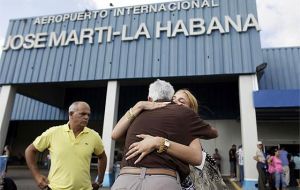MercoPress. South Atlantic News Agency
After half a century Cuba scraps travel restrictions, but they remain for ‘human talent’
 The measure is part of the reforms promised by President Raul Castro
The measure is part of the reforms promised by President Raul Castro Cuba will scrap much reviled travel restrictions starting in January, easing most Cubans' exit and return, state media said on Tuesday, in the Castro brothers’ regime first major immigration reform in half a century.
The Cuban government imposed broad restrictions on travel starting in 1961 to try to stop a mass migration of people fleeing after the 1959 revolution that put Fidel Castro in power.
The government will lift requirements to obtain an exit visa permitting departure from Cuba and a letter of invitation from someone in the destination country.
Instead, starting on January 14, Cubans will simply have to show a passport and, if needed, a visa from the country they are travelling to, government newspaper Granma said.
The changes are the latest reform under President Raul Castro, who has modestly liberalized Cuba's Soviet-style economy. They are sure to please Cubans who have chafed at the country's travel restrictions.
The process of obtaining the needed documents is time consuming and expensive, with no guarantee at the end that the government would grant permission to leave. The difficulty in travel has helped fuel charges for years that freedoms are limited in Cuba.
The changes are part of work “to update the current migratory policy adjusting it to prevailing conditions in the present and foreseeable future,” Granma said.
The measure extends to 24 months, from the current 11, the amount of time Cubans can be out of the country without losing rights and property, and they can seek an extension, Granma said.
In theory, the changes should make it easier for Cubans to not only travel, but to work abroad and return home when they are ready. But they will still have to obtain visas from most countries.
Granma said restrictions would still be in place for some people, likely to include doctors and other professionals who Cuba does not want to leave.
“Those measures aimed at preserving the human capital created by the Revolution from the theft of talents practiced by the powerful nations shall remain in force,” it said.




Top Comments
Disclaimer & comment rules-

-

-

Read all commentsSo how can Argentina claim the Falkland Islanders are held hostage by the UK (despite them being able to come and go as they please) and ignore the reality that Cubans are literally held hostage by their government?
Oct 17th, 2012 - 06:11 am 0This new policy will create a fabulous display of 'the law of unintended consequences'
Oct 17th, 2012 - 06:18 am 0Cubans reaching 18 and wondering what to do with their life will grab the list of proscribed professions and avoid every one of them like the plague. Who wants to study medicine for 7 years and be rewarded with a cage?
Comment removed by the editor.
Oct 17th, 2012 - 10:39 am 0Commenting for this story is now closed.
If you have a Facebook account, become a fan and comment on our Facebook Page!